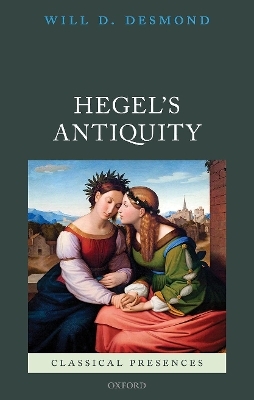
Hegel's Antiquity
Oxford University Press (Verlag)
978-0-19-883906-4 (ISBN)
Hegel's Antiquity aims to summarize, contextualize, and criticize Hegel's understanding and treatment of major aspects of the classical world, approaching each of the major areas of his historical thinking in turn: politics, art, religion, philosophy, and history itself. The discussion excerpts relevant details from a range of Hegel's works, with an eye both to the ancient sources with which he worked, and the contemporary theories (German aesthetic theory, Romanticism, Kantianism, Idealism (including Hegel's own), and emerging historicism) which coloured his readings. What emerges is that Hegel's interest in both Greek and Roman antiquity was profound and is essential for his philosophy, arguably providing the most important components of his vision of world-history: Hegel is generally understood as a thinker of modernity (in various senses), but his modernity can only be understood in essential relation to its predecessors and 'others', notably the Greek world and Roman world whose essential 'spirit' he assimilates to his own notion of Geist.
Will Desmond completed his doctorate in classics and philosophy at Yale University, where he was a lecturer for two years before returning to Ireland. After lecturing at University College Dublin, Trinity College Dublin, and the Milltown Institute of Theology and Philosophy, he arrived at the National University of Ireland, Maynooth in 2007. His research interests centre on intellectual history, particularly in the Greek classical period and certain modern receptions of antiquity; recurrent themes include virtue ethics, political philosophy, historiography, and metaphysics. His current research remains interdisciplinary, focusing on nineteenth-century German receptions of both Greek and Roman cultures, especially among Idealist and Romantic writers.
Frontmatter
List of Abbreviations
1: Hegel and the Ancient World
1.1: Between old and new
1.2: A historical trio: Germany, Italy, Greece
1.3: Hegel's life and intellectual development
1.4: One system in three formulae
1.5: The encyclopaedic ideal: Hegel and Wolffian Altertumswissenschaft
1.6: Hegel's Antiquity: overview
2: Beautiful City, Lawful Empire, Rational State
2.1: Politics of the will
2.2: Philosophy of Right: moments of antiquity
2.2.1: Abstract right
2.2.2: Morality
2.2.3: Ethical life
2.2.3.1: Families: Greek, Roman, Christian
2.2.3.2: Civil society
2.2.3.3: State: patriotism, constitution, great men, war
2.3: Lectures on the Philosophy of History: ethical life evolving
2.3.1: Beautiful city
2.3.2: Lawful empire
2.4: The World-Spirit and its own: who owns ancient art?
3: Art
3.1: Art, arts, and the Classical Ideal
3.2: System of the individual arts: architecture, sculpture, painting, music, poetry
3.2.1: Architecture
3.2.2: Sculpture
3.2.3: Painting
3.2.4: Music
3.2.5: Poetry
3.2.5.1: Epic
3.2.5.2: Lyric
3.2.5.3: Drama
3.3: Finale: the end of art?
4: Religion
4.1: The dialectic of religions: God, gods, and worship
4.2: Greek religion
4.3: Roman religion
4.4: Early Christianity and late antiquity
4.5: A profane prophet: 'I say unto you, "You must become God"'
5: Philosophy
5.1: Concepts of philosophy
5.2: Thales to Aristotle
5.2.1: Presocratics
5.2.2: Sophists and Socrates
5.2.3: Plato
5.2.4: Aristotle
5.3: Three Hellenistic systems
5.3.1: Stoicism
5.3.2: Epicureanism
5.3.3: Scepticism
5.4: The Neoplatonic synthesis
5.5: The unfinished synthesis
6: History, Cosmos, Mind, and (Not Quite) Everything
6.1: History and philosophy
6.2: Hegel's Greece and Rome in world history
6.3: Hegel's Mediterranean, Earth, Big History, and Cosmic Mind
6.4: The living and the dead: between antiquity and modernity
Endmatter
Works Cited
Index
| Erscheinungsdatum | 28.09.2020 |
|---|---|
| Reihe/Serie | Classical Presences |
| Verlagsort | Oxford |
| Sprache | englisch |
| Maße | 142 x 223 mm |
| Gewicht | 614 g |
| Themenwelt | Geisteswissenschaften ► Philosophie ► Geschichte der Philosophie |
| Geisteswissenschaften ► Philosophie ► Philosophie Altertum / Antike | |
| Geisteswissenschaften ► Philosophie ► Philosophie der Neuzeit | |
| Geisteswissenschaften ► Sprach- / Literaturwissenschaft ► Anglistik / Amerikanistik | |
| Geisteswissenschaften ► Sprach- / Literaturwissenschaft ► Literaturwissenschaft | |
| ISBN-10 | 0-19-883906-5 / 0198839065 |
| ISBN-13 | 978-0-19-883906-4 / 9780198839064 |
| Zustand | Neuware |
| Informationen gemäß Produktsicherheitsverordnung (GPSR) | |
| Haben Sie eine Frage zum Produkt? |
aus dem Bereich


